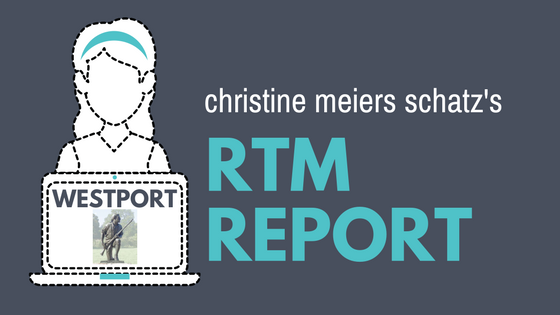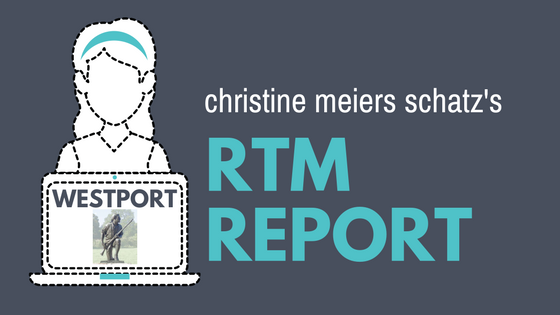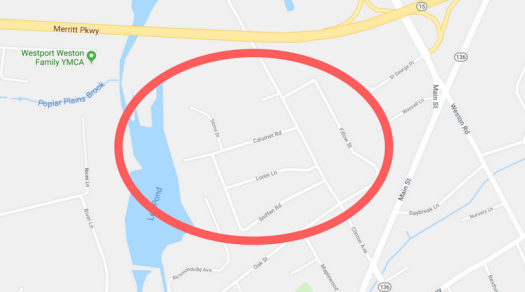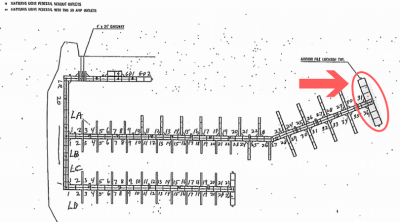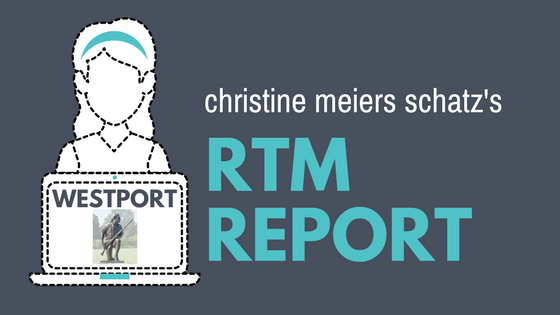SHORT SUMMARY:
Disclaimer: What’s below is my interpretation of the meeting and not an official communication from the RTM or from the Town of Westport.
In short, the RTM did the following:
- Appropriated $2,750,000 - and authorized bonds/notes to finance this amount - to extend the sewer line to homes on 8 streets.
- Appropriated $23,000 for a new filter for the smaller, "training pool" at Longshore.
- Appropriated $102,000 for the replacement of the outer "T-head" dock at E.R. Strait Marina, and
- Listened to the first reading of a proposed ordinance to ban marijuana-related businesses, excluding medical marijuana dispensaries.
DETAIL:
AGENDA ITEM #1: The appropriation of $2,750,000, and authorization of bonds/notes to finance this amount, to extend the sewer line to homes on 8 streets
 The RTM voted unanimously (30-0) to approve an appropriation of $2,750,000 for the construction of an extension of the public sewer to 141 homes on Clinton Avenue, Fillow Street, Breezy Knoll, Richmondville Avenue, Sniffen Road, Loren Lane, Calumet Road, and Stone Drive.
The RTM voted unanimously (30-0) to approve an appropriation of $2,750,000 for the construction of an extension of the public sewer to 141 homes on Clinton Avenue, Fillow Street, Breezy Knoll, Richmondville Avenue, Sniffen Road, Loren Lane, Calumet Road, and Stone Drive.
The appropriation should not affect the mill rate. Instead, all costs associated with the design, construction, and financing of the project are "benefit assessed" to the homeowners that the new sewer extension serves. This means that the 141 homeowners will choose to either pay off this expense in one payment up front or in regular payments over 19 years. Like other homes using the sewer system, the residents will also pay the regular yearly fees for system-wide use, improvements, and repairs.
RTM member Wendy Batteau asked for information regarding the town's debt levels as it relates to the town's general fiscal health. It seemed like this information would be provided at another meeting.
AGENDA ITEM #2: The appropriation of $23,000 for a new filter for the smaller, “training pool” at Longshore
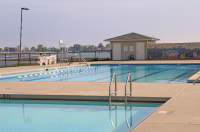 The RTM voted unanimously (30-0) to approve an appropriation of $23,000 for a new filter, replacement cartridges, installation, and other related costs for the "training pool" at Longshore. As compared to the lap pool, the training pool is smaller and may also be more shallow. The current sand filter is 21 years old, and these filters are usually replaced after 15 years.
The RTM voted unanimously (30-0) to approve an appropriation of $23,000 for a new filter, replacement cartridges, installation, and other related costs for the "training pool" at Longshore. As compared to the lap pool, the training pool is smaller and may also be more shallow. The current sand filter is 21 years old, and these filters are usually replaced after 15 years.
Jennifer Fava, the Director of the Department of Parks and Recreation, explained that the "Sta-Rite" cartridge filter is expected to be more cost effective than a sand filter. The Sta-Rite cartridge filter has the same life expectancy as the sand filter it would be replacing, but it costs approximately $10,000 less and the replacement cartridges are half the cost of the sand cartridges for the same time period. The cartridge filter will also use less water because, unlike the sand filter, it doesn't need to be regularly backwashed.
The filter will take approximately one week to install. Ms. Fava said that she expects installation will be complete before the Longshore pools open for the summer.
As mentioned by Ms. Fava and in my agenda summary, the town received only one bid for this job. RTM member Chris Tait said that Ms. Fava followed the requisite process for soliciting bids, but suggested that the town may want to reexamine its bidding process. It is my understanding that 2 RTM members might be proposing a new ordinance regarding competitive bidding - I'll keep you posted.
AGENDA ITEM #3: The appropriation of $102,000 for the replacement of the outer “T-head” dock at E.R. Strait Marina
 The RTM voted unanimously (31-0) to approve an appropriation of $102,000 t0 replace the T-head dock at the E.R. Strait Marina at Longshore. This part of the dock bears the brunt of wind and wave damage from any storm. The particular T-head at issue was damaged during Hurricane Irene, Superstorm Sandy, and at other high wind storms, the most recent of which occurred this past fall.
The RTM voted unanimously (31-0) to approve an appropriation of $102,000 t0 replace the T-head dock at the E.R. Strait Marina at Longshore. This part of the dock bears the brunt of wind and wave damage from any storm. The particular T-head at issue was damaged during Hurricane Irene, Superstorm Sandy, and at other high wind storms, the most recent of which occurred this past fall.
The appropriation should not affect the mill rate. Instead, the $102,000 will come from an account that is funded by boater fees. Insurance will pay for at least part of the replacement.
Ms. Fava explained that she believes that replacement, for $102,000 is the more prudent option compared to repairing the dock ($47,883), because: (1) the structural integrity of the dock is already compromised due to the collective damage from the different weather events and would likely be further damaged in future storms (2) if repaired, the dock would probably need to be replaced in 5 years (if it isn't destroyed before then), and (3) the new dock would have a more substantial bracket system and technology that includes a wave attenuator, which helps disperse wave energy and prevents future damage.
AGENDA ITEM #4: The first reading of a proposed ordinance to ban marijuana-related businesses, excluding medical marijuana dispensaries
Ms. Fuchs, the RTM Secretary, did the "first reading" of an ordinance sponsored by RTM members Greg Kraut and Andrew Colabella:
No marijuana business may be located in Westport. For purposes of this section, a marijuana business shall include, but shall not be limited to, marijuana cultivators, marijuana testing facilities, marijuana product manufacturers, marijuana wholesalers, marijuana retailers (other than a medical marijuana dispensary established and operated pursuant to Section 32-35 of the Town of Westport Zoning Regulations) or any other type of marijuana-related business.
In the video below you can watch the reading and see Mr. Kraut provide some background information regarding the proposed ordinance. I've summarized this information and subsequent news regarding the ordinance in the paragraphs following the video.
Mr. Kraut explained that the statute is intended to (1) deter those looking to set up large medical marijuana dispensaries as a precursor to recreational marijuana retail, (2) give the town time to establish clear safety guidelines, including "sobriety" driving tests for marijuana users, and (3) allow time for the town to determine whether any revenue it might collect related to this activity would outweigh the local financial and societal costs of allowing recreational marijuana businesses to operate here.
Mr. Colabella subsequently decided not to sponsor the ordinance for personal reasons and, on April 5th, Mr. Kraut formally withdrew the proposed ordinance. He stated, "I believe it would be more prudent to wait until P&Z makes their final determination about the current applications for medical marijuana locations." In this email Mr. Kraut also provided some additional background information regarding the ordinance and, in particular, he responded to the FAQ, "Why should we consider implementing this ordinance now?" I've summarized his response below:
- Although some states have allowed towns to "opt out" of any legislation legalizing marijuana, other states have not included opt out provisions in their legislation. Because the momentum for legalization is growing both in Connecticut and nationally, "I can't think of any good reason to take the risk [of not being proactive], especially knowing the State of Connecticut's previous attitude towards Fairfield County;"
- He pointed out that several towns in New Jersey are preemptively passing similar ordinances in anticipation of the legalization of recreational marijuana, and that towns did the same in Massachusetts, Colorado, Oregon, and California; and
- He explains that in Massachusetts and Oregon, the municipalities receive only up to 3% of governmental revenue from marijuana businesses and the state receives the overwhelming share of the revenue. Based on this data and Connecticut's dire fiscal situation, "the state most likely will look to take most, if not all, of the revenue." And "there is a high likelihood that if we get any anticipated municipal revenue it will be insufficient to fund extra services needed at the local level." (perhaps the ordinance would send a message to Hartford that it needs to provide municipalities with a fair amount of any municipal revenue generated by marijuana businesses or towns could ban marijuana businesses?)
The Connecticut Post included an article regarding the proposed statue, which you can read here. I am quoted. For what it is worth, the quote was taken out of context somewhat. I understand procedurally how an ordinance is reviewed and voted on by the RTM. I am curious, however, about the way the proposed ordinance seeks to explicitly limit any future recreational business by medical marijuana dispensaries. In theory, the zoning regulations should already contain this limitation because the regulations authorize a single special use - medical marijuana dispensaries.
Disclaimer: This post has been my interpretation of the agenda and not an official communication from the RTM. You can view the official video of the entire meeting here.
